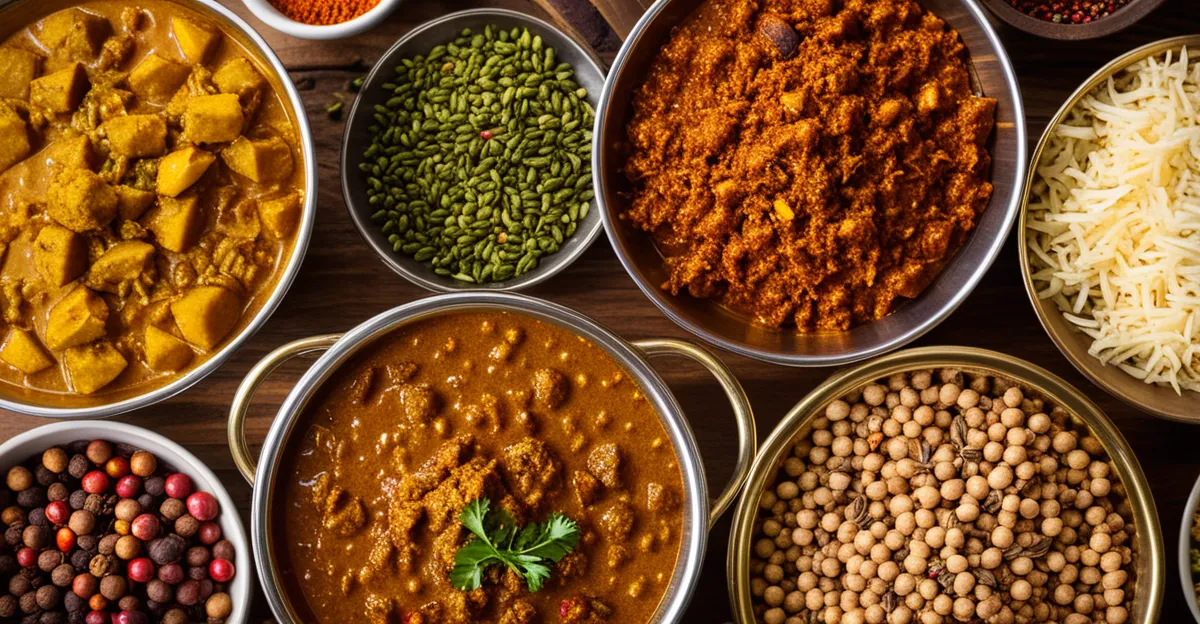Essential Spices for UK Curry Dishes
Curry dishes in the UK are renowned for their rich and diverse flavors, which are primarily derived from a blend of essential spices. These spices not only define the dish’s taste but also add complexity and depth.
Overview of Traditional Spices
UK curry dishes often incorporate a mixture of traditional spices, each contributing to the overall flavor profile. Common spices include turmeric, cumin, coriander, garam masala, and chili powder. These are staples in many curry recipes and are vital in recreating authentic flavors.
Also to read : How Does Traditional British Cuisine Reflect Its Rich Cultural Heritage?
Key Flavor Profiles
Each essential spice offers distinct flavor attributes that enhance curry dishes:
- Turmeric: Known for its earthy, slightly bitter flavor and vibrant yellow color.
- Cumin: Offers a warm and nutty taste that enriches the savory profile.
- Coriander: Provides a citrusy and slightly sweet note, often balancing the pungency of other spices.
- Garam Masala: A complex blend that adds warmth and depth, characterized by its aromatic properties.
- Chili Powder: Introduces varying levels of heat, allowing customization of the dish’s spiciness.
Importance of Quality and Freshness
Using fresh and high-quality spices is essential for achieving the desired curry flavors. Fresh spices contain more potent oils, resulting in improved flavor intensity. It’s advisable to purchase spices from reputable sources, ensuring authenticity and freshness. Proper storage is crucial; keep spices in airtight containers away from heat and light to preserve their qualities. By prioritizing quality and freshness, you can elevate the taste of your UK curry dishes, making each meal a memorable experience.
In the same genre : How Does Traditional British Cuisine Influence Modern UK Cooking?
Blending and Using Spices
Creating the perfect spice blending is an art that elevates the flavors of curry dishes significantly. Blending correct proportions of essential spices can transform a simple curry into an unforgettable dish. Curry preparation begins with selecting the right spices and understanding their flavor profiles to achieve that distinctive UK curry taste.
Techniques for Creating Spice Blends
To create well-balanced spice mixes, start by understanding the intensity and aroma of each spice. Toasting your spices gently in a dry pan can unlock their essential oils, enhancing both aroma and flavor. It’s an often overlooked step in cooking tips, yet extremely crucial for rich curry notes.
Balancing Spices in Traditional Recipes
Finding the right balance is key to a harmonious dish. For instance, the warmth of cinnamon could counteract the heat from chili powder, while cardamom adds a sweet layer to the spice profile. By skillfully combining these profiles, your curry preparation can achieve a harmonic balance, delightful to your taste buds.
Remember, the focus should be on complementing rather than overpowering the main ingredients, ensuring every meal is memorable and full of flavor.
Individual Spice Profiles
Understanding the individual spice profiles is key to mastering the art of UK curry dishes. Each spice offers unique flavor descriptions and contributes distinctively to the culinary experience.
Turmeric
Turmeric is revered for its earthy and slightly bitter profile, essential for both coloring and flavoring curries. Beyond its culinary uses, turmeric is also known for its anti-inflammatory and antioxidant properties, making it a popular choice for health-conscious cooks. To ensure quality, consider purchasing trusted brands such as Schwartz or East End, available in most UK supermarkets.
Cumin
Renowned for its warm and nutty taste, cumin enhances a variety of dishes. In UK cuisines, you’ll find both black and white cumin, each providing subtle yet distinctive differences. Roasting cumin seeds in a dry pan before grinding can significantly elevate their aroma, adding depth and richness to curry flavors.
Coriander
Coriander comes in two forms: seeds and ground. The seeds provide a more intense flavor, while ground coriander offers a milder, slightly sweet essence. It’s commonly paired with other spices like cumin and chili powder for a balanced flavor profile. Brands like TRS or Rajah are recommended for their commitment to quality.
Garam Masala
The intricate blend of spices in garam masala—typically including cardamom, cinnamon, and cloves—creates warmth and complexity in UK curry recipes. While store-bought blends are convenient, crafting a homemade version allows for customization, tailoring the spice profile to suit your preferences.
Chili Powder
Chili powder is central to imparting heat to curries, with types ranging from mild Kashmiri to fiery hot varieties. Achieving the right balance is essential to complement other flavors without overwhelming them. For superior quality, brands like Natco and Heera offer a wide selection, ensuring you find the perfect match for your spice-tolerance level.
Sourcing and Storing Spices
To fully experience the authentic flavors of UK curry dishes, sourcing and storing essential spices properly is crucial. Here, we’ll explore where to buy these spices and how to keep them fresh.
Recommended Stores and Online Retailers
For purchasing authentic spices, consider reputed local markets or online platforms that specialize in culinary herbs. Trusted retailers like Amazon, or UK-based shops such as The Spice Shop, provide a wide range of UK curry essentials. They ensure quality, offering spices sourced directly from regions known for their aromatic produce.
Importance of Proper Storage
Maintaining the freshness of spices is pivotal for preserving curry flavors. Store spices in airtight containers, keeping them away from light and moisture. This helps to retain their potent oils and vibrant aromas. Ensuring an organized and cool storage environment maximizes shelf life and quality.
Tips on Buying in Bulk vs. Small Quantities
When contemplating buying in bulk, consider the frequency of your curry preparation. For frequent cooks, bulk purchasing can be economical and practical. However, buying small quantities ensures reduced risk of spoilage, especially for spices with a shorter shelf life. Balancing quantity and usage will help maintain spice freshness, supporting consistently bold and flavorful curries.
Recipes Featuring Essential Spices
Exploring various curry recipes is a delightful way to appreciate the essential spices that define UK curry dishes. These recipes not only demonstrate traditional spice usage but also offer versatile curry flavors suitable for different palates and dietary preferences.
Classic Chicken Curry
Creating a classic chicken curry requires a harmonious blend of key spices. The process begins with essential ingredients like turmeric, garam masala, and cumin, which provide the rich flavors and warming notes characteristic of this dish. Start by marinating the chicken with yogurt and a touch of garam masala. Sauté onions, garlic, and ginger in oil until caramelized, then add turmeric and cumin to enhance the aroma and color. Simmer the mix with tomatoes before introducing the marinated chicken. Cook until tender, ensuring the flavors meld beautifully.
Vegan Curry
For a plant-based twist, a vegan curry showcases spice selection tailored to highlight fresh vegetables. Traditional spices such as coriander and chili powder are pivotal in achieving a robust taste. Begin by sautéing onions, bell peppers, and spinach with spice-blended coconut milk. Introduce a dash of coriander to balance the sweetness and a sprinkle of chili powder to customize heat levels. This dish, rich in nutrients, pairs beautifully with steamed rice or naan.
Tips for Customizing Curry Recipes
When customizing curry recipes, consider adjusting spice levels to personal taste. For a milder dish, reduce the chili powder, while enhancing cumin can deepen earthiness. Experiment with seasonal ingredients such as squash or aubergine for adaptability. Avoid overpowering the main elements by ensuring spice balance; rather, let them complement the dish’s primary flavors. This attention to detail ensures each preparation is unique yet rooted in classic traditions.



